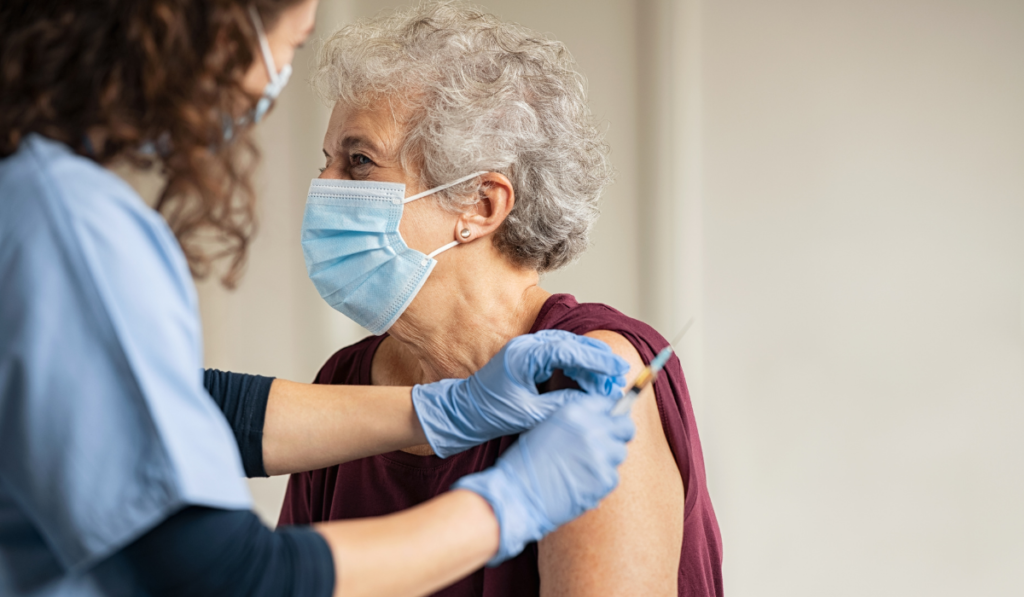COVID-19 Vaccines: What you Need to Know
Canadians started receiving COVID-19 vaccines on December 14, 2020, sparking hope that the pandemic will eventually end. But the vaccine rollout has also raised fears and questions. Who will get the vaccine? Is it safe? Can I get it if I am immunocompromised? And much more. Our Scientific Director, Dr. Diane Lacaille, answers some of these questions below.
Which COVID-19 vaccines are approved for use in Canada?

Health Canada approved the Pfizer-BioNTech vaccine for SARS-CoV2 (the virus that causes COVID-19) on December 9th, the Moderna vaccine on December 23rd, and the Oxford-AstraZeneca vaccine on February 26, 2021. The exact role of the Oxford-AstraZeneca vaccine in the rolling-out of the vaccination program has not yet been communicated by the Public Health Offices.
Are more vaccines currently being developed?
Yes, multiple vaccines are currently in various stages of testing. Many companies have been working on developing a vaccine, using different technologies. This is good news, as it increases the chances of having a number of effective and safe options. As well, it will make it easier to produce enough vaccines for everyone who wants to be vaccinated, than if we were relying on only one producer.
How do the vaccines work?
All vaccines work by presenting to your immune system proteins (called antigens) that your body recognizes as foreign. This trains your immune system to recognize the SARS-CoV2 virus and mount an immune response (i.e. develop antibodies) that will protect you if you are exposed to the virus at a later date. For SARS-CoV2 it is the spike protein on the virus (what gives the virus its crown appearance). The main differences between the vaccines is what method is used to make the protein and present it to the immune system in a way that allows the body to make antibodies against it.
The Pfizer-BioNTech and Moderna vaccines are messenger RNA vaccines, which contain the genetic coding for the spike protein, stored in a lipid nanoparticle. This is read by your cells’ own protein-making machinery to produce antigens, which then trigger an immune response. There is no risk of getting the disease, because the vaccines don’t include virus particles. There is also no risk of genetic modification of your own DNA because the messenger RNA works downstream from the DNA and does not interact with your genes. The drawback is that the vaccines need to be stored at very cold temperatures. The Pfizer-BioNTech vaccine needs to be kept at extremely cold temperatures (-80 to -60 ◦C), the Moderna vaccine at regular freezer temperatures (-20 ◦C).
The Oxford/Astra-Zeneca vaccine is a viral vector vaccine, which contains a harmless version of a virus (the vector) to deliver the genetic coding for the spike protein, and instruct the cells to produce large amounts of antigen. There is no risk of getting COVID-19 because the virus used is not SARS-CoV2 but a harmless one. The vaccine can be stored at fridge temperature.
Is the vaccine safe for people taking medications that suppress the immune system?
People who take medications that suppress the immune system are told that they should not take any “live vaccines”. These are vaccines that contain the actual virus that causes the disease but in an attenuated form, i.e. a weakened version of the virus that can replicate but doesn’t cause the disease. Examples are yellow fever and measles vaccines. In people with weakened immune system, there is a small risk that the attenuated virus could cause the disease. This is different from “inactive vaccines” which contain a virus whose genetic material has been destroyed so that it cannot infect cells and replicate (e.g. flu vaccines). Although a few live attenuated COVID-19 vaccines are being tested in trials (e.g. the BCG vaccine), none of the vaccines which are currently approved for use, or in the process of obtaining approval, are live vaccines. Therefore, there is no reason to believe that the currently available vaccines would be unsafe for immunocompromised people.
However, the Pfizer-BioNTech and Moderna vaccines, which have been approved by Health Canada, have not been tested in people with compromised immune systems (or in people under the age of 16, or pregnant women), as they were excluded from the original trials. Other vaccines that are currently under review may receive indications for people who are immunocompromised, or additional studies may be conducted on populations not included in the original trials. Studies are currently under way in children over the age of 12.
The National Advisory Committee on Immunization, the scientific body advising Health Canada on vaccinations, acknowledges the absence of efficacy or safety data for people taking medications that suppress the immune system, and recommends that risks and benefits be individually assessed by patients and their treating physician, on a case-by-case basis, to take into consideration the risk of each patient for SARS-CoV2 exposure and other factors or conditions that may influence a person’s risk of severe COVID-19 disease. Rheumatology professional organizations, including the Canadian Rheumatology Association, the American College of Rheumatology, and the British Society of Rheumatology state that patients with auto-immune diseases and patients taking immunosuppressant medications should receive the vaccine (unless they have allergies to components of the vaccine), with timing of vaccination following the public health prioritization criteria in their province. However, they should be counseled about the unknown safety and efficacy, and the potential for lower effectiveness than in people not taking immunosuppressive medications.
What are the Canadian Rheumatology Association’s recommendations on COVID-19 vaccines for people with arthritis?
The Canadian Rheumatology Association (CRA) is closely monitoring the COVID-19 vaccines in Canada. Click here to view the CRA’s position statement, which includes recommendations on the use of these vaccines for patients under the care of a rheumatologist.
Are there any resources available to help me make a decision about the COVID-19 vaccine?
The Canadian Rheumatology Association, under the leadership of Arthritis Research Canada’s Dr. Glen Hazlewood and with input from the Canadian Arthritis Patient Alliance (CAPA), has developed a Decision Aid for the COVID-19 Vaccine in Patients with Autoimmune Rheumatic Diseases, available at www.rheum.ca/decision-aid.
What should I do with my arthritis medications when I get vaccinated?
For most medications for arthritis and auto-immune diseases, no changes are needed at the time of vaccination, except the following:
- If you are taking methotrexate or a JAK Inhibitor (e.g. tofacitnib, baricitnib or upadacitnib), skip your medication for one week after each vaccine dose.
- If you are taking abatacept weekly injections, skip the week before and the week after your vaccine dose.
- If you are taking IV cyclophosphamide, take your vaccine at least one week prior to your IV infusion.
- If you are taking rituximab or ocrelizumab, have your first vaccine dose 4 weeks prior to your scheduled infusion and delay your infusion to 2-4 weeks after your second vaccine dose.
- If you are taking prednisone at a dose of 20 mg per day or higher, wait to receive your vaccine until you are at a dose lower than 20 mg per day.
- If you are on any other medications, even if they suppress the immune system, you don’t need to make any changes to your medications when you receive the vaccine.
For more detailed information on the recommendations, see the guidance document from the American College of Rheumatology. Please also speak to your rheumatologist and care team to determine a course of action.
How effective are the vaccines?
In large trials, the Pfizer-BioNTech and Moderna vaccines were found to be highly effective, preventing 95% of infections, across all ages, gender, races and ethnicities represented in the trials.
The Oxford/Astra-Zeneca vaccine was only tested in people of age < 55 and primarily in white people. It was found to have 62% efficacy in reducing symptomatic cases of COVID-19 in clinical trials in the United Kingdom and Brazil. This is a lower “overall” efficacy rate than was demonstrated in clinical trials for the Pfizer-BioNTech and Moderna vaccines (approved in Canada); however, the effectiveness at preventing serious outcomes of COVID-19 was excellent. Of the 5,258 people in the trials who received the vaccine, 64 got COVID-19 but none of them needed hospitalization or died from COVID-19. The vaccine is felt to be effective against the UK variant of the SARS-CoV2 virus, but not the South Africa variant. Given the lower overall efficacy, this vaccine would not be the preferable one for people who are taking immunosuppressive medications, in whom we expect that vaccination may be less effective due to their medications hampering the immune response to the vaccine.
The vaccines require two doses. The Pfizer-BioNTech doses are administered three weeks apart, the Moderna doses, four weeks apart. Full immunity is reached one week after the second dose, but even the first dose offers some protection.
It is not known how long the immunity will last after vaccination, but studies will measure the levels of immune protection over time as people get vaccinated, and booster doses will be recommended accordingly.
What are the side-effects of the vaccine?
The main side-effects are pain at the injection site and flu-like symptoms. Fatigue, headaches and joint pains have been reported.
Due to recent reports of two cases of severe allergic reactions (anaphylaxis-like) during the vaccination campaign in Britain, the Pfizer-BioNTech vaccine should not be used in people with a history of severe allergic reactions (anaphylaxis).
The Health Canada approval requires companies to continue monitoring for side-effects as vaccination is rolled out in the community, and to report on safety results from the continuation of the clinical trials for longer periods of time.
When can people expect to get the vaccine?
Vaccination started across Canada with the Pfizer-BioNTech vaccine the week of December 14. Distribution was initially complicated by the need for superfreezers to keep the Pfizer-BioNTech vaccines at extremely cold temperatures. With the approval of the Moderna vaccine on December 23rd, more widespread vaccination was possible. The timing of vaccination roll-out has been difficult to predict due to limitations and delays in vaccine supply to Canada.
Canada has secured enough doses of the Pfizer-BioNTech vaccine to vaccinate 3 million people by the end of March 2021, with 10 million to come at later dates, and options for 56 million more; as well as doses of the Oxford/Astra Zeneca to vaccinate 1 million people by end of March 2021. Canada has ordered 20 million doses of the Moderna vaccines, with an option to buy another 16 million, and 168,000 doses are expected to be received by the end of December. Vaccines have also been ordered from four other companies.
In BC, the Ministry of Health aims to vaccinate 400,000 people (10% of the population) by March 2021, and all people who want the vaccine by September 2021. A vaccination rate of 60-70% is expected by September 2021, which will reduce the rate of transmission in the community enough to provide good protection to people who cannot receive the vaccine (i.e. reach community immunity).
The initial doses of the vaccines will be distributed to long-term care homes for residents and staff, front-line health care workers in direct contact with COVID-19 patients. Next in line will be seniors over the age of 80, people who are under-housed, people living in remote and isolated Indigenous communities, and other health care workers. It is expected that by April, in Phase 3 for BC, people with underlying health conditions making them more vulnerable, which includes people receiving immunosuppressant medications that increase the risk of infection, will be prioritized. Front-line workers including teachers, grocery store workers, firefighters and people working in food processing plants will also be prioritized. As more vaccines become available, vaccines will be distributed according to age categories, in descending order.
How will I know when it is my turn to get the vaccine?
We recommend you follow the public health plan for vaccination roll-out in your province or territory (see below). In BC, immunization clinics will be set-up by health authorities. People will be able to pre-register on-line or by phone before vaccination, just before they become eligible. This will facilitate roll-out.
Where can I find information about my province/territory’s vaccine roll-out plan?
Please visit your province/territory’s COVID-19 resource page for information about vaccines:
Where can I find the latest information on Canada’s COVID-19 vaccine rollout/distribution?
For information on Canada’s COVID-19 vaccine rollout plan, please visit the Government of Canada’s website here.


























































